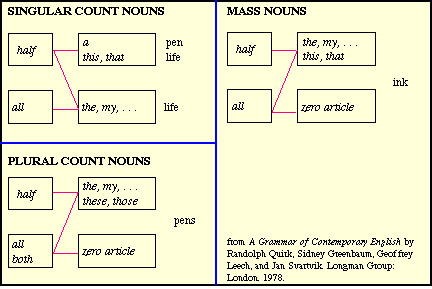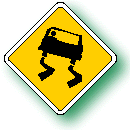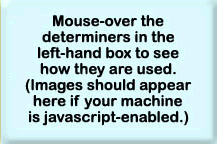

 Jump to Articles |
Articles, determiners, and quantifiers are those little words that precede and modify nouns:
the teacher, a college, a bit of honey, that person, those people, whatever purpose, either way, your choice
Sometimes these words will tell the reader or listener whether we're referring to a specific or general thing (the garage out back; A horse! A horse! My kingdom for a horse!); sometimes they tell how much or how many (lots of trees, several books, a great deal of confusion). The choice of the proper article or determiner to precede a noun or noun phrase is usually not a problem for writers who have grown up speaking English, nor is it a serious problem for non-native writers whose first language is a romance language such as Spanish. For other writers, though, this can be a considerable obstacle on the way to their mastery of English. In fact, some students from eastern European countries — where their native language has either no articles or an altogether different system of choosing articles and determiners — find that these "little words" can create problems long after every other aspect of English has been mastered.
Determiners are said to "mark" nouns. That is to say, you know a determiner will be followed by a noun. Some categories of determiners are limited (there are only three articles, a handful of possessive pronouns, etc.), but the possessive nouns are as limitless as nouns themselves. This limited nature of most determiner categories, however, explains why determiners are grouped apart from adjectives even though both serve a modifying function. We can imagine that the language will never tire of inventing new adjectives; the determiners (except for those possessive nouns), on the other hand, are well established, and this class of words is not going to grow in number. These categories of determiners are as follows: the articles (an, a, the — see below; possessive nouns (Joe's, the priest's, my mother's); possessive pronouns, (his, your, their, whose, etc.); numbers (one, two, etc.); indefinite pronouns (few, more, each, every, either, all, both, some, any, etc.); and demonstrative pronouns. The demonstratives (this, that, these, those, such) are discussed in the section on Demonstrative Pronouns. Notice that the possessive nouns differ from the other determiners in that they, themselves, are often accompanied by other determiners: "my mother's rug," "the priests's collar," "a dog's life."
This categorization of determiners is based on Understanding English Grammar by Martha Kolln. 4rth Edition. MacMillan Publishing Company: New York. 1994.
Like articles, quantifiers are words that precede and modify nouns. They tell us how many or how much. Selecting the correct quantifier depends on your understanding the distinction between Count and Non-Count Nouns. For our purposes, we will choose the count noun trees and the non-count noun dancing:
In formal academic writing, it is usually better to use many and much rather than phrases such as a lot of, lots of and plenty of.
There is an important difference between "a little" and "little" (used with non-count words) and between "a few" and "few" (used with count words). If I say that Tashonda has a little experience in management that means that although Tashonda is no great expert she does have some experience and that experience might well be enough for our purposes. If I say that Tashonda has little experience in management that means that she doesn't have enough experience. If I say that Charlie owns a few books on Latin American literature that means that he has some some books — not a lot of books, but probably enough for our purposes. If I say that Charlie owns few books on Latin American literature, that means he doesn't have enough for our purposes and we'd better go to the library.
Unless it is combined with of, the quantifier "much" is reserved for questions and negative statements:
Note that the quantifier "most of the" must include the definite article the when it modifies a specific noun, whether it's a count or a non-count noun: "most of the instructors at this college have a doctorate"; "most of the water has evaporated." With a general plural noun, however (when you are not referring to a specific entity), the "of the" is dropped:
Authority for this last paragraph: The Scott, Foresman Handbook for Writers by Maxine Hairston and John J. Ruszkiewicz. 4th ed. HarperCollins: New York. 1996. Examples our own.
An indefinite article is sometimes used in conjunction with the quantifier many, thus joining a plural quantifier with a singular noun (which then takes a singular verb):
This construction lends itself to a somewhat literary effect (some would say a stuffy or archaic effect) and is best used sparingly, if at all.
The predeterminers occur prior to other determiners (as you would probably guess from their name). This class of words includes multipliers (double, twice, four/five times . . . .); fractional expressions (one-third, three-quarters, etc.); the words both, half, and all; and intensifiers such as quite, rather, and such.
The multipliers precede plural count and mass nouns and occur with singular count nouns denoting number or amount:
In fractional expressions, we have a similar construction, but here it can be replaced with "of" construction.
The intensifiers occur in this construction primarily in casual speech and writing and are more common in British English than they are in American English. The intensifier "what" is often found in stylistic fragments: "We visited my brother in his dorm room. What a mess!"
Half, both, and all can occur with singular and plural count nouns; half and all can occur with mass nouns. There are also "of constructions" with these words ("all [of] the grain," "half [of] his salary"); the "of construction" is required with personal pronouns ("both of them," "all of it"). The following chart (from Quirk and Greenbaum) nicely describes the uses of these three predeterminers:


| The three articles — a, an, the — are a kind of adjective. The is called the definite article because it usually precedes a specific or previously mentioned noun; a and an are called indefinite articles because they are used to refer to something in a less specific manner (an unspecified count noun). These words are also listed among the noun markers or determiners because they are almost invariably followed by a noun (or something else acting as a noun). |
 CAUTION! Even after you learn all the principles behind the use of these articles, you will find an abundance of situations where choosing the correct article or choosing whether to use one or not will prove chancy. Icy highways are dangerous. The icy highways are dangerous. And both are correct. |
The is used with specific nouns. The is required when the noun it refers to represents something that is one of a kind:
The moon circles the earth.
The is required when the noun it refers to represents something in the abstract:
The United States has encouraged the use of the private automobile as opposed to the use of public transit.
The is required when the noun it refers to represents something named earlier in the text. (See below..)
| If you would like help with the distinction between count and non-count nouns, please refer to Count and Non-Count Nouns. |
Merriam-Webster's Dictionary says that we can use an before an h- word that begins with an unstressed syllable. Thus, we might say an hisTORical moment, but we would say a HIStory book. Many writers would call that an affectation and prefer that we say a historical, but apparently, this choice is a matter of personal taste.
For help on using articles with abbreviations and acronyms (a or an FBI agent?), see the section on Abbreviations.
First and subsequent reference: When we first refer to something in written text, we often use an indefinite article to modify it.
A newspaper has an obligation to seek out and tell the truth.
In a subsequent reference to this newspaper, however, we will use the definite article:
There are situations, however, when the newspaper must determine whether the public's safety is jeopardized by knowing the truth.
Another example:
"I'd like a glass of orange juice, please," John said.
"I put the glass of juice on the counter already," Sheila replied.
Exception:
When a modifier appears between the article and the noun, the subsequent article will continue to be indefinite:
"I'd like a big glass of orange juice, please," John said.
"I put a big glass of juice on the counter already," Sheila replied.
Generic reference: We can refer to something in a generic way by  using any of the three articles. We can do the same thing by omitting the article altogether.
using any of the three articles. We can do the same thing by omitting the article altogether.
The difference between the generic indefinite pronoun and the normal indefinite pronoun is that the latter refers to any of that class ("I want to buy a beagle, and any old beagle will do.") whereas the former (see beagle sentence) refers to all members of that class.
Proper nouns: We use the definite article with certain kinds of proper nouns:
Abstract nouns: Abstract nouns—the names of things that are not tangible—are sometimes used with articles, sometimes not:
Zero articles: Several kinds of nouns never use articles. We do not use articles with the names of languages ("He was learning Chinese." [But when the word Chinese refers to the people, the definite article might come into play: "The Chinese are hoping to get the next Olympics."]), the names of sports ("She plays badminton and basketball."), and academic subjects ("She's taking economics and math. Her major is Religious Studies.")
When they are generic, non-count nouns and sometimes plural count-nouns are used without articles. "We like wine with our dinner. We adore Baroque music. We use roses for many purposes." But if an "of phrase" comes after the noun, we use an article: "We adore the music of the Baroque." Also, when a generic noun is used without an article and then referred to in a subsequent reference, it will have become specific and will require a definite article: "The Data Center installed computers in the Learning Center this summer. The computers, unfortunately, don't work."
Common count nouns are used without articles in certain special situations:
| idiomatic expressions using be and go | We'll go by train. (as opposed to "We'll take the train.) He must be in school. |
| with seasons | In spring, we like to clean the house. |
| with institutions | He's in church/college/jail/class. |
| with meals | Breakfast was delicious. He's preparing dinner by himself. |
| with diseases | He's dying of pneumonia. Appendicitis nearly killed him. She has cancer (You will sometimes hear "the measles," "the mumps," but these, too, can go without articles.) |
| with time of day | We traveled mostly by night. We'll be there around midnight. |
Choosing articles and determiners: Briefly defined, a determiner is a noun-marker: when you see one, you know that what follows is a noun or noun phrase. There is a list of such words in the table below. When you place your mouse-cursor over a word or pair of related words (such as either/neither), you will see in the right-hand frame an image describing the kinds of words that word can modify.
Zero article (see table below) means either that no article would be appropriate with that kind of noun or that that kind of noun can be used (in that context) without an article.
 |
||||||||||
If you would like to see these images listed on one page, click HERE.
Notice that there is a difference between a "stressed" some or any and an "unstressed" some or any. Consider the words in ALL CAPS as shouted words and you will hear the difference between these two:
In terms of the words they usually modify, the unstressed some and any do not modify singular count nouns.
An excellent text for an in-depth study of articles is A University Grammar of English by Randolph Quirk and Sidney Greenbaum. Longman Group: Essex, England. 1993. Used with permission. Another good resource, especially for students for whom English is a second language, is Quick Access: Reference for Writers by Lynn Quitman Troyka. Simon & Schuster: New York. 1995. Used with permission.
Another place to discover more about the use of articles is at Purdue University's Online Writing Lab (OWL). See, also, the University of Toronto's Rules for Using the Word The and Rensselaer's handout on Article Usage. The online journal for Teachers of English as a Second Language has several quizzes on article usage. Students should be forewarned, however, that the best way to address this problem (if it is one) is to immerse oneself in the use of English, paying particular attention to these "little words."